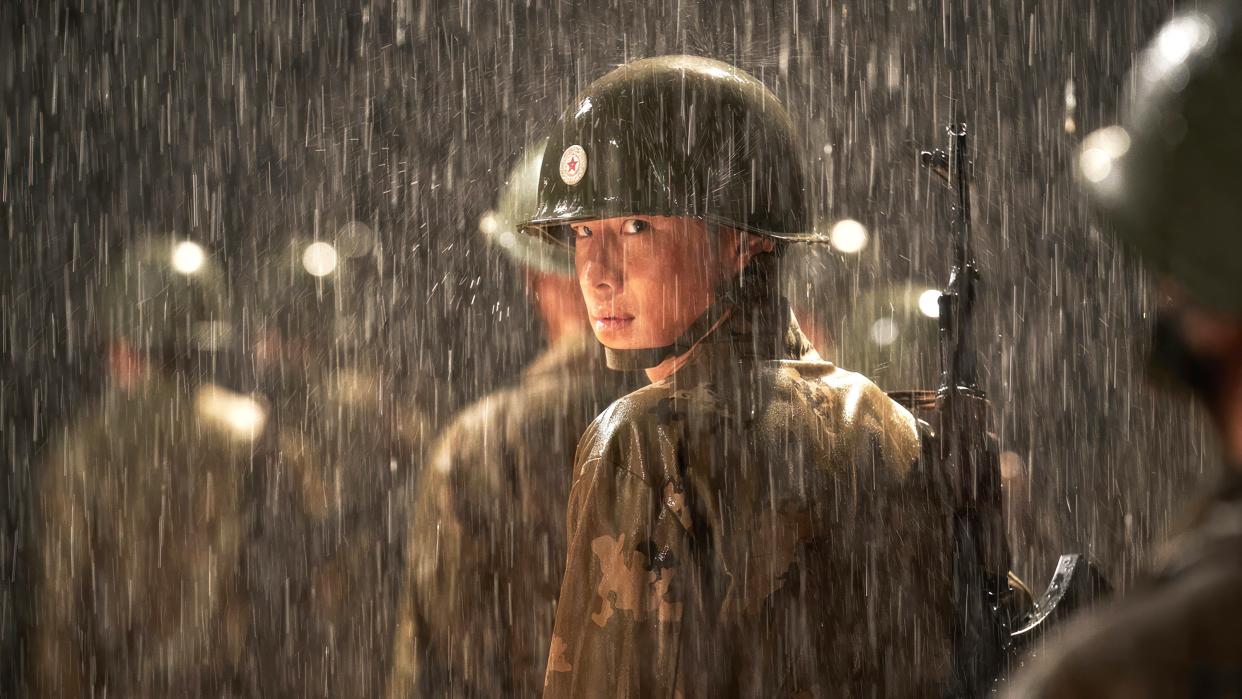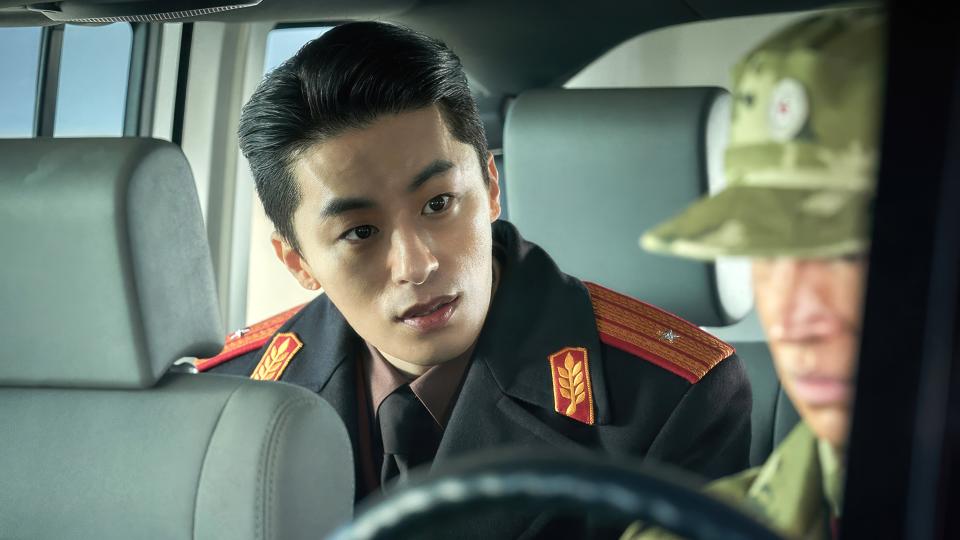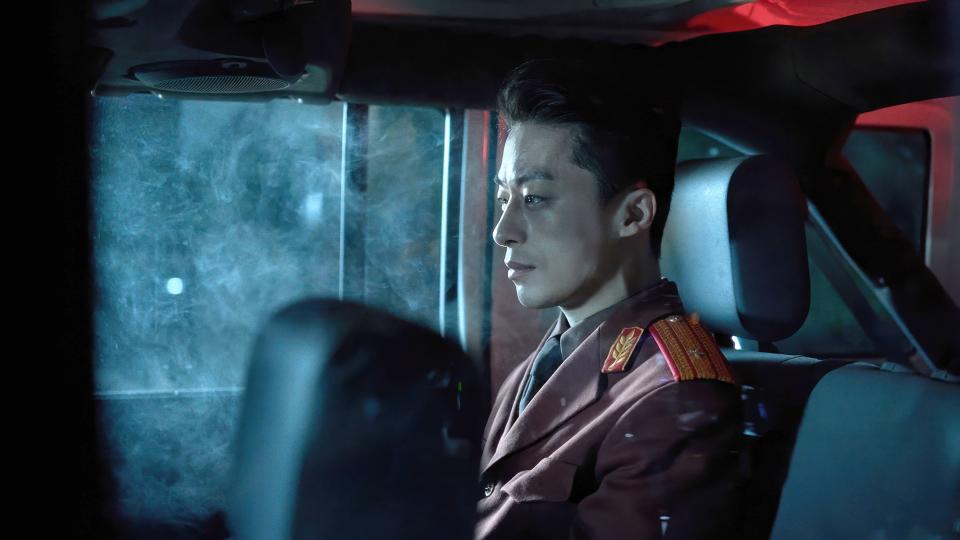Inside the Queerbaiting Controversy Behind ‘Escape,’ South Korea’s Latest Action Blockbuster

In “Escape,” the latest South Korean thriller directed by Lee Jong-pil, a soldier named Im Kyu-Nam (Lee Je-Hoon) fights to escape North Korea and build a better life for himself across the DMZ border. But it’s the story of his ruthless commanding officer, Ri Hyun-Sang (Koo Kyo-Hwan), and what he’s escaping that’s even more intriguing.
The promo for “Escape” has relied heavily on the cat-and-mouse dynamic between its two stars, as you’d probably expect. Faces almost touching, intense staring into each other’s eyes — if we didn’t know better, we’d suspect there might be some gay tension underlying all that military machismo. And it turns out we were right. Except this secret love story doesn’t involve “Escape’s” protagonist. Instead, the film gradually finds that same romantic yearning between Hyun-Sang and a third, mysterious figure played by notable K-drama star Song Kang.
More from IndieWire
A few weeks before “Escape’s’ international release, a clip posted online teased their chemistry with shared furtive glances suggesting more might be going on between them. Or at least it did to fervent fans keen to see two of their faves play same-sex lovers on screen.
At a press conference held on June 17, director Lee Jong-pil fanned those flames further by explaining that Song Kang’s character, Seon Woo Min, plays a “Tinker Bell-like figure” who reveals “the past desires and inner feelings of Hyun-Sang.” Lee Jong-pil also mentioned how Woo Min was originally meant to be played by a female actor before he realized that “wouldn’t be as interesting,” so he chose to go for something “short yet impactful” with Song Kang.
Sounds pretty gay to us. But since then, director Lee told Sports Kyunghyang that he “didn’t intend” for the relationship between Hyun-Sang and Woo Min to be “queer-coded.” Instead, he hopes audiences can fill in the empty spaces for themselves, and that’s why he deliberately kept things ambiguous in the story. And in Pride Month, no less.
Queerbaiting accusations started to fly around faster than the bullets fired Kyu-Nam’s way upon his escape. (See here, here, and here, for example.) But is that fair? How can you accuse a film of teasing queer fans without having actually seen the film itself? Well, it turns out these detractors weren’t reaching after all. Having now seen “Escape” for ourselves, we can’t help but wonder if Lee Jong-pil was talking about a different film altogether in that latter interview because Hyun-Sang and Woo Min’s connection is anything but ambiguous by the end.
From the moment we first see Song Kang’s enigmatic character Woo Min in the officer’s hall, Hyun-Sang and the camera both fixate on him. When people ask if he came to the ceremony with his wife, Hyun-Sang’s eyes immediately flit to Woo Min, clearly distracted. It turns out his nameless wife is pregnant at home, and that’s all we learn of her because this story is far more interested in Hyun-Sang’s love interest in the room.

At this point, there’s no outright declaration of their feelings, even when Woo Min strides over and interrupts the conversation to ask if Hyun-Sang has stopped playing the piano now that he’s back in North Korea. “I heard his piano skills are top-notch,” Woo Min tells the women present, who in turn spur him on to perform for them. “I knew your fingers looked special,” says one, prompting a suspicious laugh from Woo Min.
Hyun-Sang claims that he supposedly “forgot everything,” and it’s clear he’s not just talking about his skills with the piano. Later on, we discover that the pair once knew each other in Russia, where Hyun-Sang competed in an international piano competition. But the look Woo Min gives Hyun-Sang — when the latter denies remembering everything — shows that he certainly hasn’t forgotten their time together. That’s why he came over to prompt talk of the piano, because he wanted to bring up their past, the history they shared before, outside of North Korea.
And then the music begins. Hyun-Sang’s “special” fingers caress the keys as Woo Min closes his eyes and goes back in time to a happier place when they were together. At this point in the film, their connection hasn’t fully been revealed — that comes later via flashback — but even now, Koo Kyo-Hwan and Song Kang adeptly convey so much with just the occasional glance and flicker of longing across their faces.
Woo Min walks off at the end of the performance, overcome with emotion. After that, it’s not until the end of “Escape” that the pair interact one last time. Alone in his car, Hyun-Sang’s phone lights up. The call is from someone named “The Bastard I Loved” (according to the film’s English subtitles). Yes, really. So of course, it’s Woo Min on the line. Hyun-Sang looks around quickly to check that he’s alone and then answers.
“I enjoyed your performance,” says Woo Min (Although we suspect he’s not just talking about the piano recital). “Not as good as you used to be,” The Bastard Hyun-Sang Loved continues. “What happened to the winner of international piano competitions?” Hyun-Sang tries to change the subject, but Woo Min is persistent.
“You can’t forget it, can you? Our days in Russia… at the Saint Petersburg theater…”
Hyun-Sang is suddenly lost in time, reliving an old performance on stage with Woo Min watching carefully in the audience. And then the memory shatters as soldiers approach the car. Hyun-Sang hangs up on Woo Min, who’s never heard from again in the film. Yet his impact is felt almost immediately after when Hyun-Sang beats a prisoner to a pulp with his fists, suddenly overcome with anger.
We never see Hyun-Sang and Woo Min together in a physical sense, nor do they declare their love outright. Perhaps they never even got to be together in Russia, either. But you can’t tell us that the palpable rage Hyun-Sang takes out on that poor man comes from reminiscing with a bestie you could still see any time. No, that’s love, or at least the pain that lost love can bring, and director Lee Jong-pil knows that, too. Why else would the piano music from that shared memory of a better time continue playing over this horrific outburst of violence if the two are not so deeply connected?

That pain carries over into the central conflict as Im Kyu-Nam — remember him? — faces off against Hyun-Sang one last time before escaping to South Korea. “You think there was nothing I wanted to do?” screams Hyun-Sang. “What the hell do you know? Not a damn thing.” And there it is. The real reason why Hyun-Sang is so hellbent on stopping his old friend from defecting. If he can’t be free to live as his authentic true self, why should anyone else get to? That’s also why Hyun-Sang’s final scene ends with him reading a message saying, “Fear a meaningless life, not death itself.” Because life has no meaning if you can’t love who you’re supposed to love.
Argue all you want, but this reading of the film is hard to deny, especially once that phone screen pops up. With one call, “Escape” is no longer just about a man escaping the physical confines of an oppressive, fascist nation. It also becomes the story of a closeted gay (or queer) man who’s given up on escaping the deep self-loathing and bitterness that’s trapped him in an endless cycle of pretense and shame.
Of course, “Escape” would never lead with that narrative. Such stories are few and far between in Western blockbuster cinema, let alone in South Korea, where LGBTQ+ representation still lags behind. Aside from a few notable exceptions — such as Park Chan-wook’s “The Handmaiden” — most Korean films and TV shows still perpetuate tired stereotypes or avoid queerness entirely. Even big success stories like 2021’s “Vincenzo” insist on queerbaiting still, and the less said about “Squid Game‘s” predatory tropes, the better.
That’s not to say things aren’t improving. As South Korea inches ever closer to finally passing anti-discrimination laws based on gender and sexual orientation, Korean entertainment has also begun to embrace the BL drama, aka “Boys Love,” with titles like “To My Star,” “Wish You,” and “Where Your Eyes Linger.” And just this week, Netflix announced a new high-profile series named “Soul Mate” which charts a 10-year romance between a Korean man and a Japanese man across borders.
Yet it will be a while until storytelling anywhere can escape the borders that prevent queerness from going fully mainstream in fare like “Escape.” There’s been talk of a prequel to Lee Jong-pil’s film that would explore more of Hyun-Sang’s past and, presumably, his relationship with Woo Min — although Koo Kyo-Hwan reckons “where we leave him is just right” (via K-ennews).
So in the absence of that direct acknowledgment, just remember a queer reading of “Escape” can be true regardless of whether the director and everyone involved admit it or not. Because once a story is out there, it belongs to those who watch it.
“Escape” opens in U.S. theaters Friday, July 5 from Well Go USA Entertainment.
Best of IndieWire
The 30 Best Nude Scenes in Film, from 'Shortbus' to 'Blue Velvet' to 'No Hard Feelings'
The 15 Best Thrillers Streaming on Netflix in July, from 'Fair Play' to 'Emily the Criminal'
Sign up for Indiewire's Newsletter. For the latest news, follow us on Facebook, Twitter, and Instagram.

 Yahoo News
Yahoo News 
